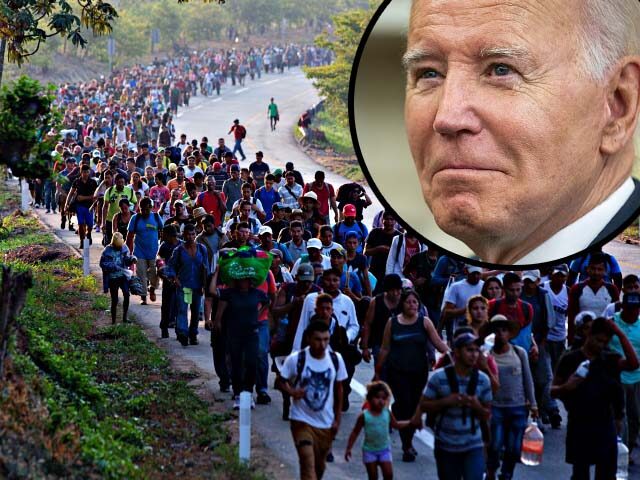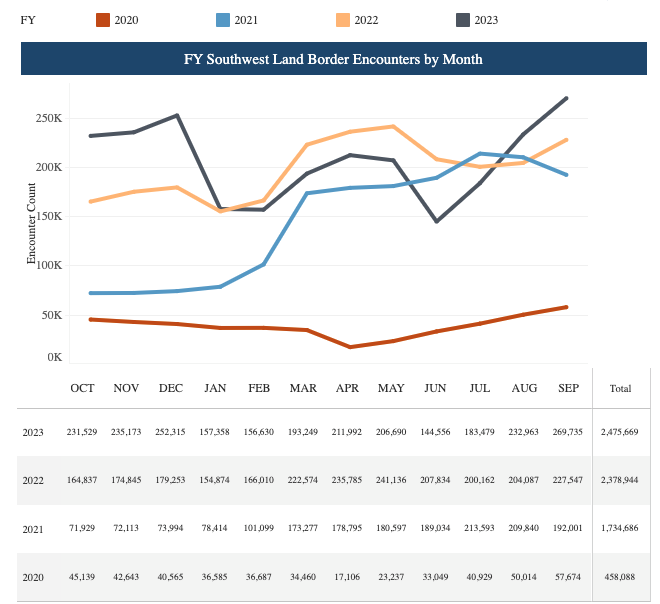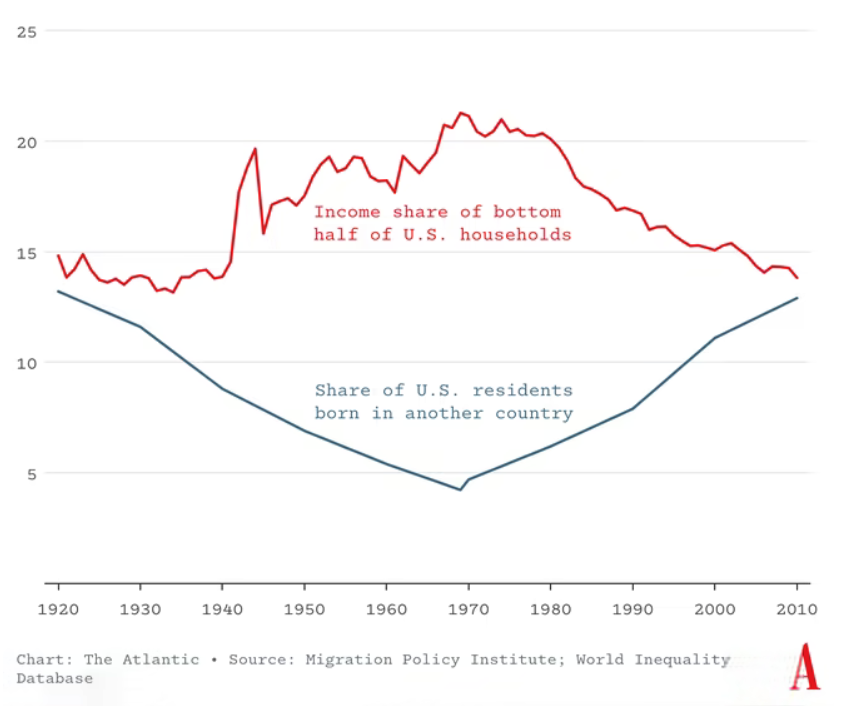President Joe Biden’s deputies welcomed at least one economic migrant into the United States during the last 12 months for every American newborn or high-school graduate.
Roughly 3.5 million economic migrants crossed the southern border during the government’s October-to-September budget year, according to federal data released October 21.
In contrast, 3.67 million Americans were born during the matching 12-month period in 2022, according to the Census Bureau. That 2022 number includes at least 400,000 births to illegal migrants.
The inflow also creates vast economic competition for the 3 million American youths who graduated from schools in the 10 months up to October 2022, the bureau reported.
One predictable result is that the new migrants are pricing ordinary Americans out of housing.
The New York Times reported August 17 on the growing number of evicted, homeless Americans who are living in their autos:
Ms. Audet, 49, earns over $72,000 a year as a social worker for the Washington State Department of Social and Health Services. But a combination of bad luck, bad debt and a bad credit score priced her out of her apartment in Bellevue, another suburb of Seattle, one of the most expensive housing markets in the country. With an eviction looming, she put her furniture in storage this spring and began parking the sedan in a U-shaped parking lot outside a church in Kirkland.
The car, her biggest investment, became her home — the roof turned into a dining table, the trunk a closet. And a weathered stretch of blacktop provided by a Methodist church became her yard, her neighborhood and her safe place.
In other parking lots across the country, car dwellers shared the hardships that landed them there: A man who scraped by delivering pizzas in Santa Barbara ended up in his Nissan Frontier when the pizza parlor cut his hours. A 35-year-old who installed home security systems ended up in his Chevy Suburban when he lost control of the drill, snapping his radial tendon. And one woman said she had to choose between helping her mother or herself.
In contrast, many migrants are being fast-tracked into American housing by government-funded, business-backed, progressive groups who increasingly divorce themselves from the interests of ordinary Americans. For example, Governing.com reported on October 23 from Chicago:
Soon after settling in the shelter, [Venezualan Angela] Davila, 45, began to work, first in construction and then in a mushroom factory, he said. Now he rents a basement apartment from Matt Joynt, the volunteer who first picked up Davila and his family from a police station to take them to the shelter.
“It’s so nice here. It finally feels like a home,” he said in Spanish on a recent day, surveying his new apartment from a chair by the kitchen counter. “ …
They recently celebrated a birthday for one of Davila’s sons in the backyard with other volunteers and asylum-seekers. “They’re like family now,” Joynt said.
The year’s inflow was revealed on October 21, when Biden’s deputies reluctantly released the September numbers on a Saturday when few people track the news.
The year’s inflow hit 2.62 million when September’s inflow of 341,000 southern migrants was revealed.
Between May and September 2023, just 300,000 migrants were deported.
The official data on the southern inflow did not include roughly 650,000 “gotaways” who sneaked over the border, nor the more than 240,000 migrants imported directly from their countries via the parole pathway. Those inflows push the cross-border inflow to roughly 3.5 million.
The 2023 inflow of 2.6 million is in addition to the 2.5 million economic migrants welcomed in 2021 and 2022. Those migrants already were helping to cut wages and spike rents.
The 2023 southern inflow of 2.6 million does not include the annual inflow of roughly 1 million legal immigrants and at least 1 million visa workers who stay for a few months or several years. If they are added to the inflow, Biden imported two migrants for every newborn American.
The 2023 southern inflow is six times the 151,000 inflow during President Donald Trump’s last year in 0ffice.
The inflow included 1.1 million migrants who walked through the official routes through the border wall.
The inflow included many global migrants, including 52,000 Chinese and 93,000 Indians, 51,000 Filipinos, 19,000 Turks, and 292,000 people from other distant countries, such as Angola, Cameroon, and the Congo.
Mayorkas’ inflow also included 163,000 Haitians, 196,000 Cubans, 103,000 people from Ecuador, and 386,000 easily deported Mexicans.
The inflow included 1.55 million single men, plus 927,000 women and children in family groups.
Almost 140,000 young people — mostly job-seeking teenagers — walked across the border via the “Unaccompanied Alien Child” loophole. Many of those young migrants take dangerous jobs and some are used as prostitutes.
Amid the global rush, Biden’s deputies posted a statement detailing their request for $14 billion to help move more migrants into U.S. communities:
We are taking steps to speed work authorizations for those who are eligible. The supplemental request includes … An additional $1.4 billion in SSP [Shelter and Services Program] grants to local governments and non-profits for temporary food, shelter, and other services for recently arrived migrants.
Biden’s border chief is Alejandro Mayorkas. He is a business-backed, Cuban-born, pro-migration zealot who says he wants to deliver more workers to employers.
“Regrettably, our legal immigration system is not designed to meet the needs of employers here in the United States,” Mayorkas told the Senate’s judiciary committee in May. He continued:
We have employers who are striving to hire, to find people who could fill jobs to contribute to our country’s economic prosperity. Regrettably, regrettably, our legal immigration system is not designed to meet that need of employers here in the United States, despite the fact that individuals from other countries want to come here to work — even seasonally, even temporarily — earn the money that they can bring back to their home countries and support their families there.
Polls show that a growing majority of Americans recognize that immigration is making life difficult for ordinary Americans. Those polls are backed up by survey data.
“It’s harder than ever for Americans to afford a home,” real estate firm Redfin noted in an October 17 report:
A homebuyer must earn $114,627 to afford the median-priced U.S. home, up 15% ($15,285) from a year ago and up more than 50% since the start of the pandemic. That’s the highest annual income necessary to afford a home on record.
The federal Bureau of Labor Statistics reported falling wages on October 12:
Real average hourly earnings for all employees decreased 0.2 percent from August to September, seasonally adjusted, the U.S. Bureau of Labor Statistics reported today. This result stems from an increase of 0.2 percent in average hourly earnings combined with an increase of 0.4 percent in the Consumer Price Index [of inflation] for All Urban Consumers.
The pro-migration, pro-establishment magazine, The Atlantic, admitted on October 23:
The decades when the American masses enjoyed their fastest income gains—in the middle of the 20th century—were also the decades when immigration was near historic lows. The 1965 [immigration] law ended this era and caused a sharp rise in the number of immigrants entering the workforce. Shortly afterward, incomes for poor and working-class Americans began to stagnate. The 1940s, ’50s, and ’60s were a time of low immigration and rapidly rising mass living standards. The period since the ’70s has been neither.
Extraction Migration
The federal government has long operated an unpopular economic policy of Extraction Migration. This colonialism-like policy extracts vast amounts of human resources from needy countries, reduces beneficial trade, and uses the imported workers, renters, and consumers to grow Wall Street and the economy.
The migrant inflow has successfully forced down Americans’ wages and also boosted rents and housing prices. The inflow has also pushed many native-born Americans out of careers in a wide variety of business sectors and contributed to the rising death rate of poor Americans.
The lethal policy also sucks jobs and wealth from heartland states by subsidizing coastal investors with a flood of low-wage workers, high-occupancy renters, and government-aided consumers.
The population inflow also reduces the political clout of native-born Americans, because the population replacement allows elites and the establishment to divorce themselves from the needs and interests of ordinary Americans.
In many speeches, border chief Alejandro Mayorkas says he is building a mass migration system to deliver workers to wealthy employers and investors and “equity” to poor foreigners. The nation’s border laws are subordinate to elite opinion about “the values of our country” Mayorkas claims.
Migration — and especially, labor migration — is unpopular among swing voters. A 54 percent majority of Americans say immigration under President Joe Biden is making life harder for all, according to a Reuters/Ipsos poll of 4,415 adults in September. That number is up from 48 percent in July 2023. Fifty-seven percent of independents agree with the “harder” view, while just 17 percent “strongly” disagreed.



COMMENTS
Please let us know if you're having issues with commenting.